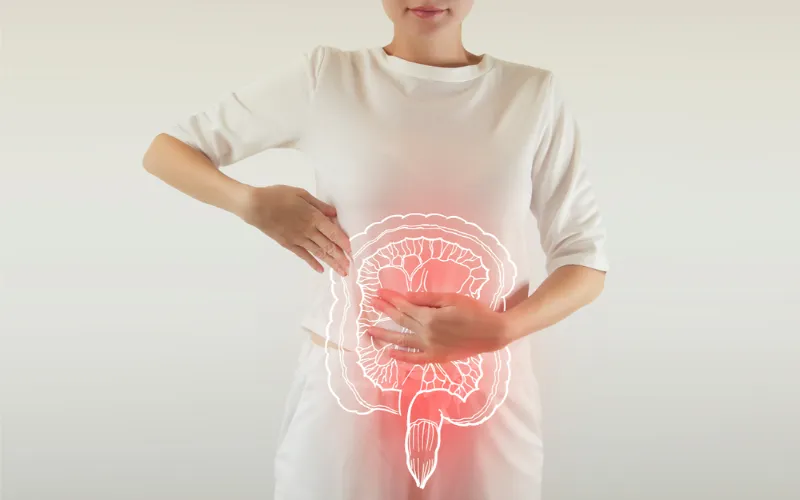Are you tired of constantly dealing with constipation and the distress it brings? Imagine a natural path to regularity, where an army of friendly bacteria is your best ally. Welcome to the increasingly acclaimed world of probiotics – a game-changer in gut health. This blog post will show how probiotics help ease constipation and naturally improve gut health. Ready to take control of your digestive woes? Dive in!
Probiotics can sometimes effectively ease constipation, as certain strains of beneficial bacteria can help promote regular bowel movements. However, the effectiveness of probiotics for constipation varies by individual, and it’s important to consult with a healthcare professional before starting any new treatment regimen.
Understanding Probiotics and Their Role in Gut Health
Probiotics are live bacteria and yeasts that are beneficial for our gut health. Our digestive system is home to trillions of microorganisms, collectively known as the gut microbiota, which play a crucial role in maintaining overall health. Know more about water and gut microbiota.
The Significance of Gut Balance
The balance of good and bad bacteria in the gut is essential for proper digestion, immune function, and nutrient absorption. However, poor diet, stress, antibiotics, and other medications can disrupt this delicate balance.
The Garden Analogy of Gut Health
Imagine your gut as a garden with various types of plants. Just like a well-tended garden thrives with diverse plant species, a healthy gut requires a variety of beneficial bacteria to flourish. Probiotics act as the seeds or fertilizer for these beneficial bacteria, ensuring that they thrive and maintain an optimal balance. They help create a robust microbial ecosystem in the gut that contributes to better digestion and overall well-being.
Learn More Ingestion vs Digestion
Probiotics at Work
Probiotics work by colonizing the intestines and competing with harmful bacteria for resources and space. They produce compounds such as lactic acid and short-chain fatty acids that inhibit the growth of pathogenic bacteria. Additionally, certain strains of probiotics have been found to strengthen the intestinal barrier function, reducing inflammation and preventing toxins from leaking into the bloodstream.
Learn More about Probiotics for weight loss
Linked Health Improvements
The consumption of probiotics has been linked to improvements in several gastrointestinal conditions, such as irritable bowel syndrome (IBS), inflammatory bowel disease (IBD), and constipation.
Now that we understand the role probiotics play in maintaining gut health, let’s explore how they combat constipation specifically.
How Probiotics Combat Constipation
Constipation is a common digestive issue characterized by infrequent bowel movements and difficulty passing stool. It can be caused by various factors, including inadequate fiber intake, dehydration, a sedentary lifestyle, certain medications, or imbalances in gut microbiota.
Probiotics help combat constipation by regulating bowel movements and improving overall gut motility. They achieve this through multiple mechanisms:
- Stimulating Peristalsis: Peristalsis is the wave-like muscular contractions in the intestines that propel stool forward. Certain strains of probiotics, such as Bifidobacterium lactis BB-12 and Lactobacillus casei Shirota, have been shown to stimulate peristalsis, facilitating regular bowel movements.
- Increasing Stool Frequency: Probiotics can enhance the frequency of bowel movements, reducing the likelihood of constipation. Lactobacillus acidophilus NCFM has demonstrated the potential to increase stool frequency and improve overall gut transit time.
- Softening Stool Consistency: Probiotics can also influence stool consistency, making it softer and easier to pass. This is particularly beneficial for individuals with hard or dry stools associated with constipation.
Know more about Probiotics are Good for What Exactly? Know the fact
The Role of Probiotics in Overall Health
Probiotics have gained significant popularity in recent years for their potential to improve gut health naturally. But what exactly are probiotics, and what role do they play in our overall health?
Microbial Community in Our Gut
Probiotics are live microorganisms that provide health benefits to the host when consumed in adequate amounts. These beneficial bacteria can be found in various foods and supplements, and they work by colonizing the gut and interacting with the existing microbial community.
The Impact of Gut Imbalances
Our gut is home to trillions of microorganisms, collectively known as the gut microbiota. This complex ecosystem is crucial in digestion, nutrient absorption, immune function, and mental well-being. Imbalances or disruptions within the gut microbiota can lead to various health problems, including constipation.
To illustrate this further, let’s consider a scenario where harmful bacteria dominate an individual’s gut microbiota due to poor diet, stress, or antibiotic use. These detrimental bacteria can interfere with normal digestion and reduce bowel motility, leading to constipation.
Addressing Gut Imbalance with Probiotics
Introducing probiotics into our system can help restore balance to the gut microbiota and promote regular bowel movements. Probiotics increase the population of beneficial bacteria in our intestines, thus crowding out the harmful ones. They also produce short-chain fatty acids that nourish the cells lining our gut and stimulate peristalsis — the coordinated contraction of muscles that helps move stool through the digestive tract.
Probiotics and Immune Modulation
Furthermore, probiotics have been shown to modulate the immune system, reducing inflammation in the gut and supporting healthy gastrointestinal function. This immune-regulating effect may contribute to alleviating symptoms of chronic constipation caused by underlying intestinal inflammation.
Now that we understand probiotics’ essential role in maintaining a healthy gut and promoting regular bowel movements, let’s explore how to select probiotics specifically for constipation relief.
Learn More:
Selecting Probiotics for Constipation Relief: Strains to Consider
When selecting probiotics for constipation relief, not all strains are created equal. Some specific strains are more effective in stimulating peristalsis and improving bowel movements. Here are some strains to consider:
- Bifidobacterium lactis BB-12: This strain has been extensively studied for its positive effects on constipation. It helps soften stool, increase stool frequency, and improve overall bowel function.
- Lactobacillus casei Shirota: Another strain that has demonstrated benefits for constipation relief is Lactobacillus casei Shirota. It promotes regularity by enhancing gut motility and softening the stool.
- Combination of Bifidobacterium lactis BB-12 and Lactobacillus acidophilus NCFM: Research has shown that this combination can help effectively alleviate constipation symptoms. These strains work synergistically to support bowel regularity and improve digestive health.
It’s important to note that the effectiveness of probiotics may vary depending on an individual’s unique gut microbiota composition and underlying factors contributing to constipation. Personalized nutrition is key, so finding the best strain or combination for your specific symptoms is crucial.
Choosing the proper probiotic strain is like finding the perfect key for your locked door of constipation.
Now that we’ve discussed the role of probiotics in overall health and explored some strains beneficial for constipation relief, let’s delve deeper into specific strains recommended by users and experts in the field for combating constipation caused by various factors.
Specific Strains Beneficial for Constipation
When finding the right probiotic strains to alleviate constipation and improve gut health naturally, it’s essential to consider specific strains that are beneficial. These strains work by stimulating peristalsis (food movement through the digestive tract) and improving bowel movements.
Evidence-Based Strains for Constipation Relief
One strain that has demonstrated efficacy is Bifidobacterium lactis BB-12. This strain has increased stool frequency and softened stool consistency, making it easier to pass. Additionally, Lactobacillus casei Shirota has shown promising results in improving symptoms of constipation by increasing bowel movements and reducing transit time.
Furthermore, the combination of Bifidobacterium lactis BB-12 and Lactobacillus acidophilus NCFM has also been found to be effective in relieving constipation. This combination synergistically promotes a healthy gut environment and supports regular bowel movements.
Additional Probiotic Recommendations
Additionally, certain probiotics strains such as PHGG (partially hydrolyzed guar gum), Lactobacillus reuteri DSM 17938, Bifidobacterium lactis BB12, or HN019 have also been suggested as potential recommendations for constipation relief. It is important to note that individual responses may vary, and personalized nutrition focusing on finding the right probiotic strain or combination that works best for each individual’s constipation symptoms is key.
While probiotics can offer significant relief and improvements for constipation, it’s essential to be aware of potential side effects associated with their use.
Potential Side Effects of Constipation Probiotics
Probiotics are generally considered safe for most individuals, but it’s crucial to be informed about potential side effects when using them for constipation relief. It’s worth noting that adverse reactions are relatively rare, and most people tolerate probiotics well. However, a few considerations should be kept in mind.
Common Side Effects
Some individuals may experience temporary digestive distress when initiating probiotic use, including symptoms such as bloating, gas, or mild gastrointestinal discomfort. These effects usually subside as the body adjusts to introducing new beneficial bacteria.
Risks for Specific Populations
In rare cases, individuals with weakened immune systems or underlying health conditions may be at risk of developing serious infections from certain strains of probiotics. Therefore, it is always advisable to consult with a healthcare professional before starting any new supplement regimen, particularly if you have any pre-existing health conditions or concerns.
Incorporating probiotics
Consider incorporating probiotics into your routine, like introducing a new exercise into your fitness regime. It’s important to start slowly and listen to your body’s response. Just as you might experience muscle soreness as you adapt to a new workout, your digestive system may need some time to adjust to the presence of probiotics.
Overall, most individuals who incorporate probiotics into their routine for constipation relief experience positive outcomes without significant side effects. Nonetheless, it is crucial to prioritize personalized nutrition and consult with a healthcare professional who can provide tailored advice based on individual circumstances.
Recommended Probiotic Products and Natural Intake Enhancement
When choosing the right probiotic product to relieve constipation and improve gut health, several factors should be considered. These include the bacterial strains, quality, ingredients, price, and third-party testing.
Potential Probiotic Supplements in 2023
In 2023, several potential probiotic supplements have shown promising results for constipation relief. Let’s explore some of these recommended products:
Exploring Yourbiology
One reputable option is Yourbiology, a vegetarian-friendly probiotic containing four strains and 40 billion CFU (colony-forming units) per serving. This product emphasizes the importance of strain diversity in supporting gut health. By incorporating various strains of beneficial bacteria, Yourbiology aims to restore balance in the gut microbiome and promote regular bowel movements.
Highlighting Ritual
Another noteworthy brand is Ritual, which offers a probiotic supplement with two carefully selected strains and provides 11 billion CFU per serving. Ritual prioritizes transparency by clearly disclosing their sourcing and manufacturing processes. With a focus on efficacy and purity, Ritual aims to provide a reliable option for those seeking natural ways to alleviate constipation.
For individuals looking for a more comprehensive formulation, Ora might be an excellent choice. Ora’s probiotics contain 11 strains and incorporate prebiotics, fueling the beneficial bacteria already present in our guts. This combination supports bowel function and helps enhance overall digestive health. With 52 billion CFU per serving, Ora’s high-potency formula is designed to target constipation effectively.
Biotics 8 for Active Individuals
Are you someone who thrives on active lifestyles? If so, Biotics 8 may catch your attention. Formulated specifically for high-performing men, Biotics 8 offers ten strains of probiotics and provides 20 billion CFU per serving. This unique blend supports digestive health while addressing specific needs associated with an active lifestyle.
Diverse Benefits with Bestfactor
Lastly, if you’re interested in a probiotic supplement that combines gut health support with additional benefits, consider Bestfactor. This product goes beyond probiotics and includes vitamins, turmeric, and 100 billion CFU from Bifidobacterium and Lactobacillus strains. Bestfactor aims to provide comprehensive wellness support while addressing constipation by incorporating powerful ingredients known for their anti-inflammatory properties.
Personalizing Your Probiotic Choice
When selecting a probiotic for constipation relief, your needs and preferences should guide your decision-making process. Factors such as sensitivity to prebiotics, the efficacy of combined ingredients, subscription-based purchases, storage conditions, and the gradual introduction of probiotics to minimize side effects are key considerations to keep in mind.
Remember that everyone’s body is unique, and what works for one person may not work the same way for another. It’s always beneficial to consult with a healthcare professional before introducing new dietary supplements. They can provide personalized advice based on your specific health conditions and goals.
Natural Intake Enhancement
In addition to taking probiotic supplements, it’s important to focus on natural intake enhancement. This includes incorporating fermented foods such as yogurt, sauerkraut, and kimchi into your diet. These traditional foods contain naturally occurring probiotics that can help improve gut health. Additionally, increasing fiber intake through fruits, vegetables, whole grains, and legumes can aid in promoting regularity and relieving constipation.
By combining high-quality probiotic supplements with a wholesome diet rich in beneficial nutrients, you can empower yourself to enhance your gut health and find relief from constipation naturally.
Can probiotics cause any negative side effects about bowel movement regularity?
While probiotics are generally safe, some individuals may experience slight bowel movement changes such as gas or bloating when first introducing them. However, these symptoms usually subside within a few days as the gut adjusts to the new bacteria.
Are there any other natural remedies to try before turning to probiotic supplements?
Yes, several natural remedies should be considered before turning to probiotic supplements for constipation relief. Increasing dietary fiber intake, staying hydrated, and exercising regularly are all effective ways to improve gut health and encourage bowel movements.
How do probiotics improve gut health?
Probiotics improve gut health by replenishing the natural balance of beneficial bacteria in the digestive system. These live microorganisms help break down food, promote nutrient absorption, and maintain a healthy gut lining.
Are certain types of probiotics better for alleviating constipation?
Yes, certain types of probiotics have shown effectiveness in alleviating constipation. Specific strains like Bifidobacterium lactis and Lactobacillus casei can improve bowel movement frequency and consistency. In a randomized controlled trial involving 120 participants with constipation, the group receiving B. lactis experienced a significant increase in stool frequency and a decrease in transit time compared to the placebo group.
How quickly can you expect to see results from probiotic supplements when treating constipation?
The time it takes to see results from probiotic supplements when treating constipation can vary from person to person. However, research suggests that some individuals may experience improvements within a few days to a week of starting probiotic supplementation.




